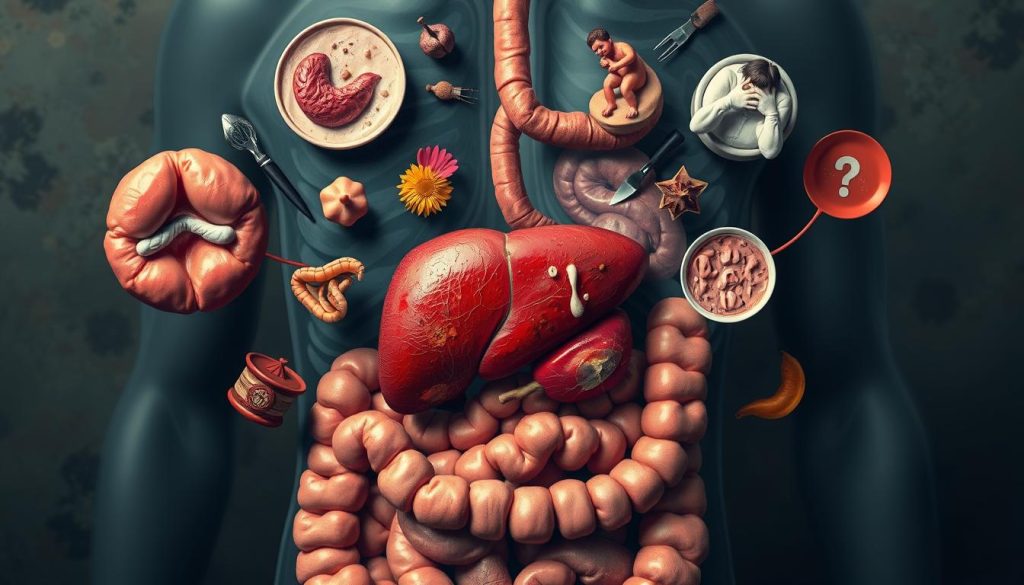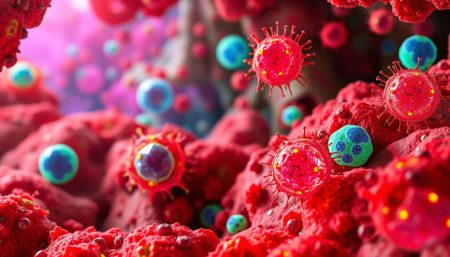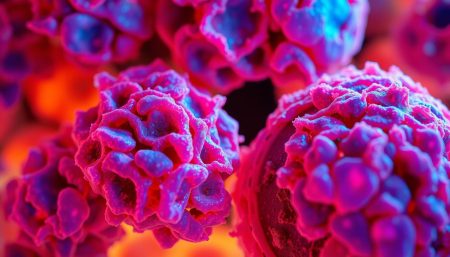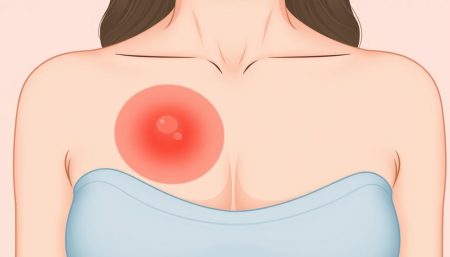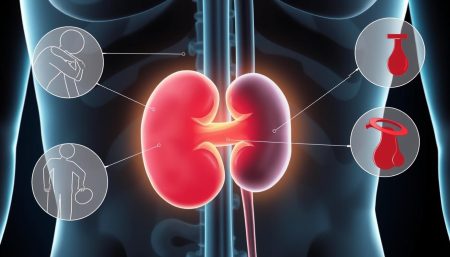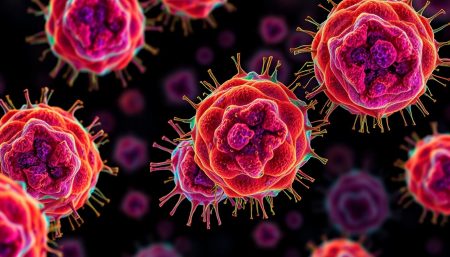Liver cancer can sneak up on you, often without early symptoms. Knowing the warning signs is key to catching it early. Signs like abdominal pain or weight loss without trying can save your life.
This article will teach you about liver cancer’s early signs. We’ll look at everything from small changes in appetite to clear signs like jaundice. Knowing these signs helps you get medical help fast if needed.
Seeing these symptoms doesn’t mean you definitely have liver cancer. Many other health issues can cause similar signs. But, it’s vital to talk to your doctor about any ongoing or worrying symptoms. Catching it early can greatly improve your chances of recovery, so stay alert and take care of your health.
Understanding Liver Cancer and Its Impact on Health
Liver cancer is a serious disease that affects thousands of Americans each year. It happens when liver cells grow out of control, forming tumors. These tumors can spread to other parts of the body. Knowing the symptoms of liver cancer is key for early detection and treatment.
What is Liver Cancer?
Liver cancer starts in the liver’s cells. The liver is vital for filtering blood and removing toxins. As cancer grows, it can harm the liver’s function. This leads to symptoms like jaundice and fatigue.
Common Risk Factors and Causes
Several factors increase the risk of liver cancer:
- Chronic hepatitis B or C infection
- Cirrhosis of the liver
- Excessive alcohol consumption
- Obesity and diabetes
- Exposure to certain chemicals
Demographics Most Affected by Liver Cancer
While anyone can get liver cancer, some groups are at higher risk. Men are more likely to get it than women. The disease is also common in older adults, with most diagnosed at 63 years old.
| Age Group | Percentage of Cases |
|---|---|
| Under 45 | 3% |
| 45-64 | 40% |
| 65 and older | 57% |
Recognizing liver cancer symptoms early can improve outcomes. If you have persistent fatigue, unexplained weight loss, or jaundice, see your doctor right away.
Recognizing Liver Cancer Symptoms in Early Stages
Spotting liver cancer symptoms early is very important. It can greatly improve treatment results. It’s essential to know what to look for.
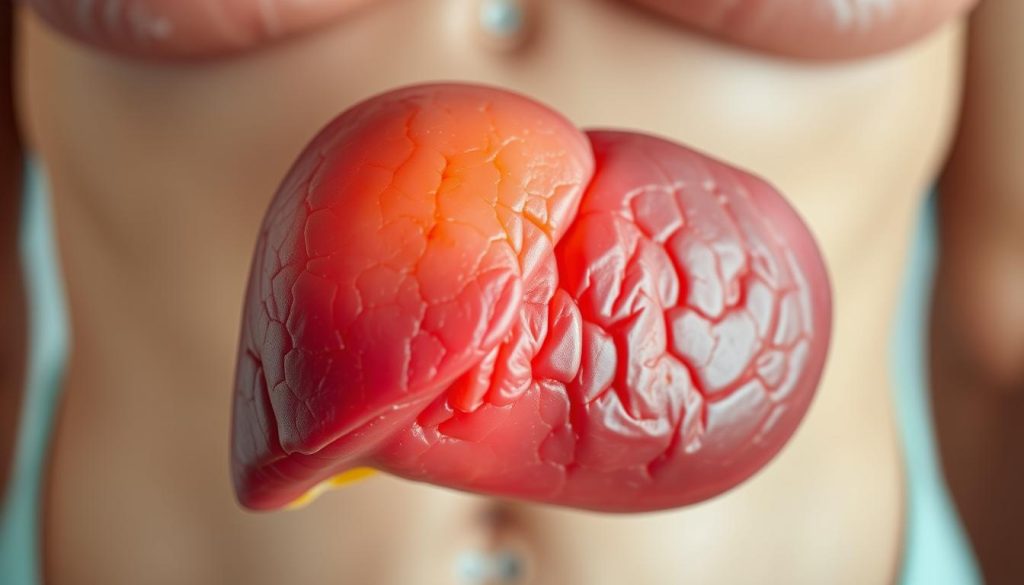
Unexplained weight loss is a common symptom. If you’re losing weight without trying, pay attention. Feeling extremely tired, even after resting, could mean your liver is not working well.
Nausea and vomiting are also signs. If you often feel sick to your stomach, or after eating, don’t ignore it. Pain or swelling in your right abdomen could also be a sign.
Changes in your skin or eyes are important to notice. Jaundice, which makes skin and eyes yellow, is a classic sign. Look out for:
- Yellowing skin or eyes
- Pale, chalky stools
- Dark urine
- Itchy skin
Regular doctor visits are key to catching liver cancer early. If you notice any symptoms, like those mentioned, talk to your doctor. Early detection can lead to better treatment and outcomes.
Abdominal Pain and Discomfort as Warning Signs
Abdominal pain can mean many things, including liver cancer. It’s key to know the types of pain and when to see a doctor. This helps catch problems early.
Types of Abdominal Pain to Watch For
Liver cancer often causes pain in the upper right abdomen. This pain can feel dull, sharp, or like fullness. If you have ongoing pain in this area, it’s a sign to watch.
When Abdominal Pain Requires Medical Attention
See a doctor if you have abdominal pain that:
- Lasts more than a few days
- Gets worse over time
- Is severe or comes on suddenly
- Is with fever, jaundice, or unexplained weight loss
These signs might mean liver cancer or another serious issue.
Distinguishing Liver Pain from Other Conditions
Liver pain is different from other belly aches:
- Location: Upper right quadrant of the abdomen
- Nature: Often constant and dull
- Triggers: May worsen after meals or when lying down
Not all belly pain is from the liver. Gallstones or pancreatitis can also cause it. A doctor can figure out what’s wrong and how to treat it.
Unexplained Weight Loss and Appetite Changes
Unintentional weight loss and loss of appetite can be signs of liver cancer. These symptoms are often missed or blamed on other things. This makes it hard to catch liver cancer early.

Liver cancer can mess with how our body works. This can make us eat less and lose weight. People with liver cancer might lose weight without trying to diet or exercise more.
Changes in appetite can show up in different ways:
- Feeling full after eating small amounts
- Losing interest in favorite foods
- Experiencing nausea or vomiting
If you notice unexplained weight loss or big changes in how you eat, see a doctor. Consult with a healthcare professional. These symptoms don’t always mean liver cancer, but they need to be checked out.
| Symptom | Possible Causes | When to Seek Help |
|---|---|---|
| Unintentional weight loss | Liver cancer, thyroid issues, diabetes | Loss of 5% body weight in 6-12 months |
| Loss of appetite | Liver cancer, depression, infections | Persistent for more than two weeks |
Early detection is important for treating liver cancer well. If you keep losing weight or losing your appetite, get medical help right away.
Jaundice and Skin Changes as Critical Indicators
Jaundice is a clear sign that your liver might be in trouble. It’s a key symptom of liver cancer. If your skin and eyes turn yellow, it’s a warning sign.
Understanding Jaundice Development
Jaundice occurs when your body can’t break down bilirubin. This yellow substance builds up in your blood. In liver cancer, tumors can block bile ducts, causing this buildup.
Skin and Eye Color Changes
The first signs of jaundice often show in the eyes. The whites turn yellowish. As it gets worse, your skin may turn yellow or greenish.
These changes can be small at first. So, it’s key to check regularly.
Associated Symptoms with Jaundice
Jaundice rarely shows up alone. You might also notice:
- Itchy skin
- Dark urine
- Pale stools
- Abdominal pain
If you see these signs with jaundice, don’t hesitate. See a doctor right away. Catching liver cancer symptoms early can greatly improve treatment outcomes.
Digestive Issues and Gastrointestinal Symptoms
Liver cancer can lead to digestive problems that impact your daily life. It’s vital to spot these signs early for timely treatment. Let’s look at some common digestive symptoms linked to liver cancer.
Nausea is often the first sign people notice. You might feel queasy or sick to your stomach, often after eating. This can cause vomiting, which may happen a lot or without warning.
Loss of appetite is another key symptom. You might eat less or feel full quickly. This can cause unintended weight loss over time.
| Symptom | Description | Action |
|---|---|---|
| Nausea | Feeling sick to your stomach | Track frequency and triggers |
| Vomiting | Throwing up food or bile | Note color and consistency |
| Loss of appetite | Reduced interest in food | Monitor weight changes |
If you have persistent nausea, vomiting, or loss of appetite, see your doctor. These symptoms can have many causes. But, it’s key to rule out serious conditions like liver cancer for your health and peace of mind.
Fatigue and Weakness: Silent Warning Signs
Fatigue is common, but persistent fatigue can be a warning sign. In the case of liver cancer, it’s a silent but important sign. Knowing the difference between normal tiredness and chronic fatigue is key for early detection.
Chronic Fatigue vs Normal Tiredness
Normal tiredness goes away with rest. Chronic fatigue doesn’t. If you’re always tired, even after sleeping well, it’s a sign. Liver cancer can cause this by messing with your body’s energy.
Impact on Daily Activities
Severe fatigue can really mess up your day. You might find it hard to do simple things, have trouble focusing, or feel very weak. These symptoms can make it hard to work, socialize, and enjoy life.
When to Seek Medical Help for Fatigue
If you’re tired for weeks or months, see a doctor. This is critical if you also have symptoms like unexplained weight loss, belly pain, or jaundice. Catching liver cancer early can lead to better treatment, so don’t ignore long-lasting fatigue.
- Fatigue lasting more than two weeks
- Inability to perform daily activities
- Fatigue accompanied by other liver cancer symptoms
- No improvement with rest or lifestyle changes
While fatigue can mean many things, don’t ignore it if it lasts a long time. Your doctor can figure out why you’re tired and help you feel better.
Fever and Night Sweats as Possible Signs

Fever and night sweats are often overlooked signs of liver cancer. These common health issues might signal a serious problem. It’s important to watch for them, as they can be signs of something more.
Fever in liver cancer patients is usually a low-grade, ongoing increase in body temperature. This happens as the body fights the growing tumor. Night sweats, or excessive sweating at night, often go hand in hand with fever. These symptoms can make daily life very hard.
What causes these symptoms in liver cancer?
- The body’s immune response to cancer cells
- Tumor-related inflammation in the liver
- Changes in metabolism due to cancer growth
Fever and night sweats can mean many things, not just liver cancer. But if you have other symptoms like abdominal pain, weight loss, or jaundice, see a doctor. Early diagnosis can lead to better treatment.
If you keep getting fever or night sweats, and you’re at risk for liver cancer, get medical help. Your doctor can run tests to find out what’s wrong and help you.
Understanding Liver Function Tests and Diagnostics
Finding liver cancer early is key to treating it well. Doctors run tests to spot liver issues and cancer signs. These tests catch problems before jaundice or other symptoms show up.
Common Blood Tests
Blood tests are the first step to check liver health. They look at enzymes and proteins that show liver function. High levels can mean liver damage or cancer.
| Test | What It Measures | Normal Range |
|---|---|---|
| ALT (Alanine Transaminase) | Liver enzyme levels | 7-56 units/liter |
| AST (Aspartate Transaminase) | Liver enzyme levels | 10-40 units/liter |
| AFP (Alpha-fetoprotein) | Protein linked to liver cancer | Less than 10 ng/mL |
Imaging Studies
Imaging tests give clear pictures of the liver. They help doctors find problems. These tests are easy and can find cancer signs early.
- Ultrasound: Uses sound waves to create liver images
- CT scan: Provides detailed cross-sectional views
- MRI: Offers high-resolution images of soft tissues
Biopsy Procedures
A liver biopsy is the best way to confirm liver cancer. It takes a small tissue sample for check-up. This is done if tests show something odd. Early detection through these tests can greatly help liver cancer treatment.
Risk Factors That Increase Likelihood of Liver Cancer
Knowing the risk factors for liver cancer is key to early detection and prevention. Some symptoms, like abdominal pain, can be hard to spot. But, knowing your risk level helps you stay alert.
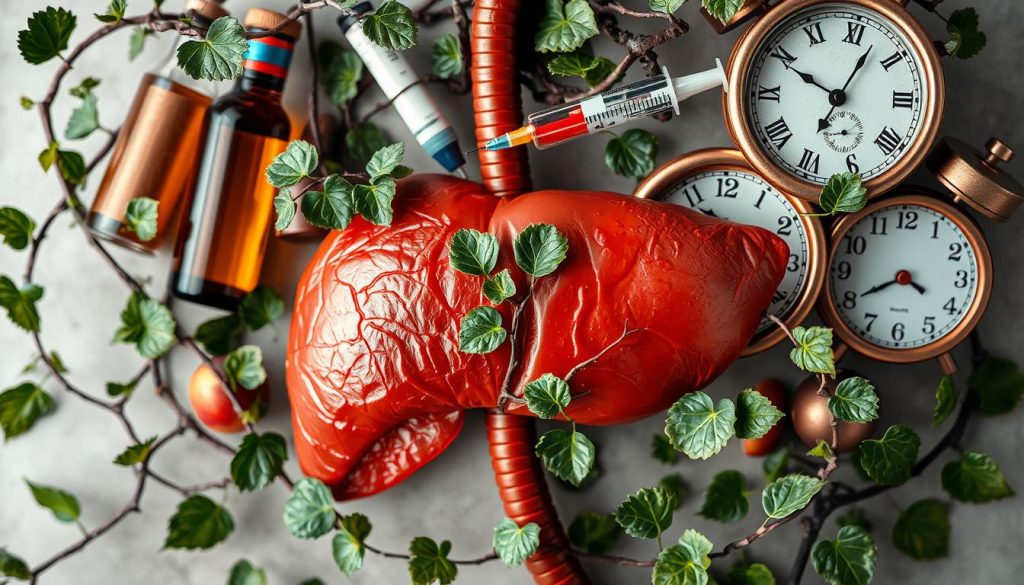
- Chronic viral hepatitis (B and C)
- Cirrhosis
- Excessive alcohol consumption
- Nonalcoholic fatty liver disease
- Obesity
- Type 2 diabetes
- Exposure to aflatoxins
- Genetic disorders (hemochromatosis, Wilson’s disease)
Chronic viral hepatitis and cirrhosis are major risks. They cause long-term liver damage, raising cancer chances. Drinking too much alcohol also harms liver cells.
Obesity and diabetes are becoming bigger concerns for liver cancer. They lead to fatty liver disease, which can turn into cirrhosis. Aflatoxins in tainted foods are also a risk in some areas.
| Risk Factor | Relative Risk Increase |
|---|---|
| Chronic Hepatitis B | 5-100 times |
| Chronic Hepatitis C | 15-20 times |
| Cirrhosis | Up to 40 times |
| Heavy Alcohol Use | 2-3 times |
| Obesity | 1.5-4 times |
Understanding these risks helps people make better health choices. Regular health checks and lifestyle changes can lower liver cancer risk. They also help catch symptoms early.
Prevention Strategies and Lifestyle Modifications
Protecting your liver health is key to avoiding liver cancer. Making smart choices in your daily life can help. This keeps your liver healthy and boosts your overall well-being.
Dietary Recommendations
Eating right is important for your liver. Include lots of fruits, veggies, and whole grains in your diet. These foods are full of antioxidants and fiber, which help your liver.
Try to eat less processed foods, saturated fats, and sugars. This helps you stay at a healthy weight and eases liver stress.
Exercise and Physical Activity
Exercise is vital for your liver. Aim for 150 minutes of moderate or 75 minutes of vigorous exercise weekly. This helps prevent obesity and fatty liver disease, which can lead to liver cancer.
Exercise also fights fatigue, a common liver symptom.
Harmful Habits to Avoid
Some habits can harm your liver and raise cancer risk. Drinking too much alcohol can cause cirrhosis and liver cancer. Smoking is also linked to liver cancer and other cancers.
Living a healthy lifestyle is essential to lower your risk of liver cancer and its symptoms.
| Habit | Impact on Liver Health | Prevention Strategy |
|---|---|---|
| Excessive Alcohol | Cirrhosis, Fatty Liver | Limit or Avoid Consumption |
| Smoking | Increased Cancer Risk | Quit Smoking |
| Sedentary Lifestyle | Obesity, Fatty Liver | Regular Exercise |
When to Seek Immediate Medical Attention
Spotting liver cancer symptoms early is key to saving lives. If you have ongoing pain in your upper right abdomen, it’s not something to ignore. It might signal liver problems, including cancer. If the pain is bad or lasts more than a few days, get medical help fast.
Jaundice is a big warning sign that needs quick action. If your skin or eyes turn yellow, call your doctor right away. This could mean your liver is seriously sick or you might have cancer. Catching it early can make a big difference in treatment success.
Other signs that mean you should see a doctor fast include losing weight without trying, having a fever with no reason, or feeling extremely tired. If you’re at risk for liver cancer because of liver disease or other reasons, watch these signs closely.
Listen to your body. If you feel something’s off, like with your digestion or energy, get medical advice. Your doctor can check your symptoms and see if you need tests to check for serious problems like liver cancer.
FAQ
Q: What are the early warning signs of liver cancer?
A: Early signs of liver cancer include abdominal pain and unintentional weight loss. Jaundice, fatigue, nausea, and loss of appetite are also symptoms. Remember, these signs can also mean other health issues. Always see a doctor for a proper diagnosis.
Q: Who is most at risk for developing liver cancer?
A: People at higher risk include those with chronic liver diseases and heavy alcohol users. Non-alcoholic fatty liver disease and toxin exposure also increase risk. Men and older adults are more likely to get liver cancer.
Q: How is liver cancer diagnosed?
A: Doctors use blood tests, imaging studies like ultrasound, CT, or MRI scans, and sometimes a liver biopsy to diagnose liver cancer. Your doctor will choose the best test based on your symptoms and risk factors.
Q: Can liver cancer be prevented?
A: While not all liver cancers can be prevented, you can lower your risk. Stay healthy by drinking less alcohol, eating well, exercising, and avoiding toxins. Regular health checks and early detection are key to prevention.
Q: What does liver pain feel like?
A: Liver pain from cancer feels like a dull ache in the upper right abdomen. It’s below the rib cage. If the pain lasts or comes with other symptoms, see a doctor right away.
Q: How quickly does liver cancer progress?
A: Liver cancer growth varies by person. Some grow slowly over months or years, while others grow faster. Early detection and treatment are key to better outcomes, so regular check-ups are important.
Q: What is the survival rate for liver cancer?
A: Survival rates depend on the cancer stage and patient health. Early-stage liver cancer has better survival rates. The 5-year survival rate for localized liver cancer is about 35%. For regional and distant spread, it’s 12% and 3%, respectively. But, individual results can differ.
Q: How does jaundice appear in liver cancer patients?
A: Jaundice shows as yellow skin and eyes. It’s caused by bilirubin buildup when the liver fails. Patients may also have itchy skin, dark urine, and pale stools. Seek medical help if you notice these signs.
Q: Can liver cancer cause fever and night sweats?
A: Yes, liver cancer can cause fever and night sweats. These are signs of the body fighting the cancer. If you have persistent fever or night sweats, along with other symptoms, see a doctor.
Q: What lifestyle changes can help maintain liver health?
A: To keep your liver healthy, limit alcohol, maintain a healthy weight, and exercise. Eat a balanced diet and avoid toxins. Get vaccinated against hepatitis B. Regular health checks and early detection are also vital.












